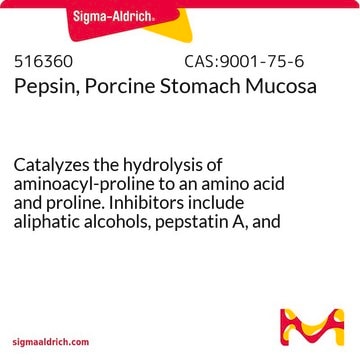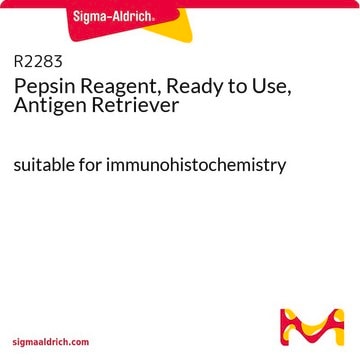P7000
Pepsin from porcine gastric mucosa
powder, ≥250 units/mg solid
Synonym(s):
Pepsin A, Pepsin from hog stomach
About This Item
Recommended Products
biological source
Porcine gastric mucosa
form
powder
specific activity
≥250 units/mg solid
mol wt
35 kDa
UniProt accession no.
application(s)
diagnostic assay manufacturing
shipped in
wet ice
storage temp.
2-8°C
Gene Information
pig ... LOC396892(396892)
Looking for similar products? Visit Product Comparison Guide
Related Categories
Application
Biochem/physiol Actions
Pepsin is the major proteolytic enzyme produced in the stomach. It digests proteins through the cleavage of interior peptide linkages..
Unit Definition
Analysis Note
Other Notes
inhibitor
Signal Word
Danger
Hazard Statements
Precautionary Statements
Hazard Classifications
Eye Irrit. 2 - Resp. Sens. 1 - Skin Irrit. 2 - STOT SE 3
Target Organs
Respiratory system
Storage Class Code
11 - Combustible Solids
WGK
WGK 1
Flash Point(F)
Not applicable
Flash Point(C)
Not applicable
Personal Protective Equipment
Certificates of Analysis (COA)
Search for Certificates of Analysis (COA) by entering the products Lot/Batch Number. Lot and Batch Numbers can be found on a product’s label following the words ‘Lot’ or ‘Batch’.
Already Own This Product?
Find documentation for the products that you have recently purchased in the Document Library.
Customers Also Viewed
Protocols
This procedure may be used for determination of Pepsin activity using hemoglobin as the substrate. It is a spectrophotometric stop rate determination.
Our team of scientists has experience in all areas of research including Life Science, Material Science, Chemical Synthesis, Chromatography, Analytical and many others.
Contact Technical Service











